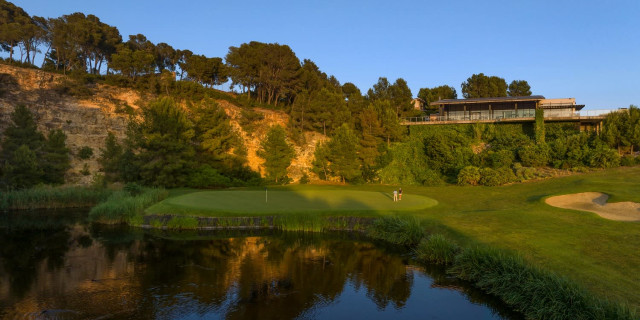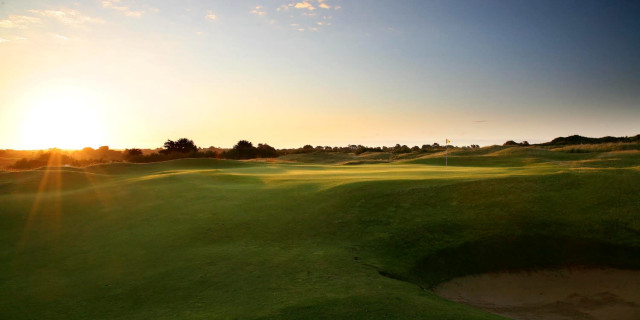
The Greatest Masters Tournaments in History
When the first official Augusta National Invitation Tournament was established in 1934, few could have envisaged what the event would grow into, namely becoming one of the world's most recognisable sporting events. Laid out across an old plant nursery in Georgia, Bobby Jones, the greatest amateur golfer in history and an American icon, partnered with Wall Street stock broker Clifford Roberts to create an exclusive golf club that provided a retreat for those seeking to escape the harsh winters of the north east United States.
Despite the tenured championships of the U.S. Open, PGA and Western Open boasting prestige, the status of Jones drew eyes for that inaugural playing of what we now know as the Masters, with Horton Smith winning that first year. Growing in stature throughout the 1940s and 50s, the Masters was elevated by the advent of television and the presence of the charismatic Arnold Palmer, who was quickly followed in his adventures by Jack Nicklaus and Gary Player.
Since then, the Masters has enjoyed a unique place on the calendar, the first men's major of the season, ushering in spring with the same picturesque holes, shots, and traditions - not least the awarding of the green jacket - that we have all grown up with. Generations of greats have been defined for many golf fans by the Masters, crowning the likes of Tom Watson, Seve Ballesteros, Nick Faldo, Phil Mickelson and Tiger Woods.
However, which of these memorable tournaments stand out from the pack? Following last year's Greatest Open Championships in History feature, we have gone through the history of the Masters, picking out two editions from each decade that best tell the story of the event, albeit it's hard to ignore some of those that had to be cut out. Don't forget that you can relive many of them in 50 Years of The Masters on YouTube and in 2019, Golfshake Staff & Ambassadors shared their own Greatest Masters Memories.
2019
There have been many captivating stories at Augusta National through the years, but none have resonated quite as deeply as the sight of Tiger Woods completing the most incredible sporting comeback of recent times. Aged 43, it had been 14 years since the Californian had won here, and 11 since his most recent major triumph in 2008, a bruising success that began a seemingly endless spiral of injury, scandal, rises and falls, surgeries and failed returns. He was done. Finished. It was a sentiment that the man himself shared.
But on a fateful Sunday, the legend was reborn, taking full advantage of a dramatic back-nine when his nearest challengers fell, almost in unison, on the perilous 12th, to produce the first come from behind major win of his career, leading to an outpouring of emotion on the 18th that was stratospheric. You'll never forget it. And we'll never see anything like it again.
2017
Sergio Garcia had played in 73 majors and was widely considered among the finest players yet to have won one, having come agonisingly close, notably at the Open Championship. The Masters seemed to be his unlikeliest pathway to success, but in 2017, the Spaniard was tied for the lead after three rounds with the consummate professional, Justin Rose, who had enjoyed an enviable record at Augusta. The Ryder Cup stars went head-to-head and the advantage swung several times on Sunday, but the Englishman had pulled clear before Garcia went birdie-eagle on the 14th and 15th. Bogeying the 17th proved costly for Rose. Both had birdie opportunities on the 18th, each missing, resulting in a playoff that Garcia won with a birdie of his own, finally securing the major title that his talent merited.
2004
Phil Mickelson waited longer for his first major than most would predicted, but he finally clinched it in style at Augusta, making birdie on the final hole to deny Ernie Els a playoff chance and claim the green jacket, leaping into the air. The South African had looked likely to enjoy his own winning moment at the Masters, had it not been for Mickelson's five birdies in seven holes to complete his euphoric moment. "Is it his time?" exclaimed Jim Nantz. It was.
2001
Now at the peak of his powers, Tiger had won the U.S. Open by 15, the Open Championship by eight, and successfully defended the PGA Championship in a thrilling duel with journeyman Bob May. Returning to Augusta, Woods led after three rounds by one shot from Phil Mickelson, with David Duval and Mark Calcavecchia a shot further back. It was Duval who made the strongest charge, tied for the lead with three holes to play, before Tiger birdied the 18th to secure a second Masters crown and fourth consecutive major victory. The Tiger Slam was complete.
1997
If 1996's battle between Faldo and Norman marked the end of one era, 1996 was the establishment of something altogether revolutionary - the reign of Tiger Woods. Having just turned professional months earlier, the 21-year-old shot 40 on the front-nine on Thursday, responding with a stunning back-nine of 30 to open with a 70. From there, it was breathtaking. 66, 65, 69. The youngster won by 12 strokes, forever changing the game, and those who viewed it, in the process.
1996
Australia's Greg Norman had endured much disappointment at Augusta, not least in 1986 and 1987, but now, he looked to have finally found his chance for redemption. The two-time Open winner had been in imperious form, shooting 63 on Thursday, and was six ahead going into Sunday. The one obstacle that remained was his greatest rival, Nick Faldo. The Englishman slowly closed the gap before Norman unravelled around the turn, leading to an 11 stroke swing and a crushing defeat for the Aussie.
1986
By 1986, Jack Nicklaus hadn't won a major in six years, and was slowly drifting away from relevance, even at Augusta. However, remarkably, the 46-year-old, with his son Jackie on the bag, turned back time with a charge of 30 on the second nine holes on Sunday to shock a pack of contenders that included Greg Norman, Tom Kite, Seve Ballesteros, Nick Price and Tom Watson. In securing his sixth victory, Jack Nicklaus remains the oldest champion in Masters history.
1980
If Player was the trailblazer for international golfers at the Masters, Seve Ballesteros was the leader for Europe, making his breakthrough in 1980. The Spaniard was seven clear after three rounds and extended that advantage on Sunday, seemingly on route to complete a record score, before stumbling around Amen Corner. However, the 23-year-old held his nerve to win by four, the first European champion, followed that decade by Bernhard Langer, Sandy Lyle and Nick Faldo.
1978
South Africa's Gary Player may have felt overshadowed by Nicklaus and Palmer at Augusta, but 1978 was solely his year. The 42-year-old shot a stunning final round of 64, including an incredible back-nine of 30 to win by one stroke ahead of Rod Funseth, Hubert Green and defending champion Tom Watson, stunning the field with his ninth and final major victory.
1975
By the mid 1970s, a succession of new stars had emerged to challenge Nicklaus, two of them namely Johnny Miller and Tom Weiskopf. Their battle at the 1975 Masters has gone down in folklore, a thrilling experience illuminated across television screens in America, but it was the Golden Bear who edged ahead of his competitors with two decisive birdies on the 15th and 16th, the latter one of the most famous putts in Masters history.
1965
Palmer had the fans, but soon Jack Nicklaus had the dominance on the course, winning at Augusta in 1963, but it was two years later that the young man from Ohio truly showcased his prodigious ability. Shooting 17-under par over the four rounds - a total that wasn't beaten until Tiger Woods came along - Nicklaus finished nine shots ahead of Palmer and Gary Player. Bobby Jones said: "He plays a game with which I am not familiar." He was untouchable.
1960
Arnold Palmer had won the Masters for the first time in 1958, but it was 1960 that thrilled the patrons and those watching from afar. Having led after three rounds, the American finished birdie, birdie to beat Ken Venturi by a shot, claiming the green jacket for a second time. That season, Palmer unforgettably produced a comeback victory at the U.S. Open, and played in the Open Championship at St Andrews, finishing second behind Kel Nagle. This was the height of his stardom.
1956
CBS televised the third and fourth rounds for the first time, a weekend defined by brutally windy conditions. Young amateur Ken Venturi looked to be running away with the title - a prospect that Jones would have surely relished - until the 24-year-old played the back-nine in six-over to lose by a shot to Jack Burke Jr. They do say that the Masters doesn't begin until the back-nine on Sunday. At 97, Burke is the oldest living champion.
1953
Four years after his life-threatening and physically debilitating car accident, Ben Hogan surpassed himself by shattering the Masters scoring record by five strokes, winning by five at 14-under par. That season, the Hawk also won the U.S. Open, and the Open Championship at Carnoustie, his only appearance in the game's oldest major.
1949
Bobby Jones stood down from playing the previous year, so 1949 marked a new era for the Masters, and it was Slammin' Sammy Snead who secured the title after recording consecutive 67s on the weekend. The sweet-swinging and inimitable American won again in 1952 and 1954, later becoming an honorary starter.
1942
The last Masters played until 1946, which saw past winner Byron Nelson overcome fellow Texan Ben Hogan in a closely contested battle, culminating in a one-shot playoff victory over 18 holes on the Monday. Hogan would have to wait nearly a decade for his taste of victory down Magnolia Lane.
1935
12 months on, and Craig Wood was again the unlucky loser, seeing Gene Sarazen hole a 4 wood from 235 yards on the 15th for an albatross - the "shot heard 'round the world" - to tie him, sending the pair into a 36-hole playoff that the 33-year-old former PGA, U.S Open and Open champion won by five shots.
1934
The first Masters, 72 invited players competed at Augusta at the request of Bobby Jones, who came out of retirement to play in the event. 25-year-old Horton Smith won by a shot from future winner Craig Wood, shooting four-under on a layout that stands unique as what we now identify as the back-nine was then the front.

Be part of the action with a selection of unique golf tournament experiences, from playing in a pro-am with the stars to watching the action at golf’s most illustrious events. Whether it’s the Masters or The Open, The Ryder Cup or WM Phoenix Open, build your own bespoke package with the experts at Golfbreaks.com.
Tags: the masters PGA Tour daily picks









